Michael J. Kramer's Blog
September 21, 2025
The Dissonance of Dissidence
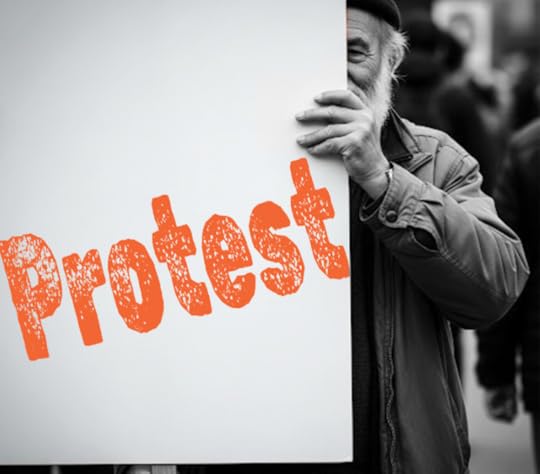 Theater Apparatus, Václav Havel’s Protest.
Theater Apparatus, Václav Havel’s Protest.I don’t really believe things are black as all that.
— Vaněk, in Václav Havel’s Protest
In Czech dissident Václav Havel’s “Vaněk plays,” totalitarian political structures are a given. The question is not what makes them tick, or how they emerged, or what they mean, but rather how one should respond to them. Does one take a radical stance or a reformist one? Does one totally refuse to conform, face the consequences, but also bask in the light of moral rectitude and purity? Or does one engage, reform, and navigate the system from within, despite the compromises this will entail? What does it mean to confront authoritarian power directly or to try to move in and below it, trying to undermine it? Havel probes the question again and again, from multiple angles and perspectives.
In Audience, Vernissage (sometimes titled Unveiling and Private View), Protest, and other plays, the Vaněk character is not exactly Havel himself, but certainly resembles him. The character is busy writing letters of protest, refusing to snitch on others, and seeking to live in truth in the face of a feeling of powerlessness within a powerful system of control and paranoia. He even, as Havel did, goes to prison for his resistance. Yet Havel does not portray Vaněk as some kind of hero. Sometimes other characters turn out to be doing more for liberation, freedom, and practical safety by trying to manipulate the system from within than opposing it entirely from without.
At first in Protest, it seems like this isn’t the case. Vaněk seems like the good guy, and his friend Staněk the compromised coward contorting himself into babbling justifications for his inaction. Vaněk merely provokes this by being himself—a dissident—and the play becomes, in essence, a painful dialogue about negligence and inertia, a duet between the two characters. Vaněk has just been released from prison and Staněk has managed to survive in the arts and popular media within the existing regime. Now Staněk has invited Vaněk over to get him to write a petition to free his daughter’s lover, the musician Javurek. Why he cannot do this himself seems pathetic and problematic in the first instance, but when Vaněk produces the letter, already written, and asks Staněk to sign it, Staněk twists himself into knots about whether he should or not do so.
Eventually, he declines to sign the letter, revealing the upside-down logic that living within totalitarianism can produce. Dissidence, Staněk reasons, as Vaněk seems to practice it, offers the light of moral purity, but Staněk bizarrely convinces himself that everyone already knows what the dissident thinks, so therefore it reduces the power of the petition itself. To sign the petition, in this Orwellian—or more accurately for Czechoslovakia, Kafkaesque—logic, is to undermine the power of signing the petition. No is yes. Signing is not signing. Standing up against oppression merely becomes another futile way of sitting down and enduring it, except maybe now from a prison cell with nothing improved for all the suffering.
At first the point of the play seems obvious: Vaněk good, Staněk bad; moral clarity and purity good, complicity and spinelessness bad; dissident good, person trying to manipulate dissident without putting himself on the line bad. The end of the play, however, brings yet another turn of events that renders the letter moot, and suggests how if Vaněk had sent it, this might have made the situation worse. And the situation grows even murkier when it emerges that perhaps Vaněk was less heroic in prison than he first suggested.
Here is Havel’s most explicit use of Vaněk not to celebrate moral certainty, but rather to reveal the torturous, perilous situation that totalitarianism raises for all involved. In fact, I wondered if the production that Theater Apparatus staged at the Multi-Use Community Cultural Center as part of the Rochester Fringe Festival overplayed Vaněk’s anger at the end of the play when he witnesses his friend Staněk’s duplicity and moral cowardice. In this play, Vaněk is there to be a mirror for Staněk. After all, as their similar names suggest, the characters might be understood more as twins than one might first think. Havel perhaps saw himself in Staněk as in Vaněk despite his own bravery.
To be sure, from the armchair, the choices between protest and complicity may seem clear—and sometimes they were in Communist Czechoslovakia just as often they are today—but just as often, as many Americans are learning, the situation grows more murky the more one exists within it. Interventions, protests, protecting people, keeping totalitarianism from going totally mad, it turns out, takes many different forms and formats, versions and variations. There are many ways to fight. And fear is understandable. It’s not that Staněk has any moral standing by the end of the play, it’s just that the mysteries of defeating totalitarianism seem to be bigger than a simple contrast of characters.
There is something bitter, rueful, sobering, and sad about this dramatic realization, but also very beautiful. After all, Havel’s reputation as a political figure—remember he would go on to serve as the Czech Republic’s president after the 1989 Velvet Revolution—makes it seem like he had it all figured out all along, that he was always confident that his, the right, side of history would win out. The Vaněk plays show otherwise. Instead, they offer a far more complicated and honest reckoning with systems of totalitarian rule. The reality of dissidence is more dissonant, Havel’s fictional plays propose.
Protest‘s greatest achievement is to protest ethical certitude itself without giving way to apathy, cynicism, complicity, or doublethink. Perhaps it calls less for the pure path of pious certainty than something more like a messy moralism. One must take a stand and be brave, but one can also adopt a humility in the face of contingencies, a wickedly ironic sense of justice in the face of fighting a massive system of repression. To remain human in this situation is not always to remain in control. After all, that is precisely what fighting totalitarianism involves—defeating systems of control. To dissent in such a situation is instead to struggle, imperfectly, toward freedom’s chance.
A few scenes from Protest by actors David Millstone and Drew Valins and dialogue from the late Hon. Madeleine Albright; Susan Galbraith, Artistic Director, Alliance for New Music-Theatre; Ambassador Martin Palous; and Ambassador Cynthia Schneider, Co-Director, The Laboratory for Global Performance and Politics:
Vaclav Havel’s Protest, in Conversation at The Gathering/CrossCurrents Festival, HowlRound Theater Commons, 9 May 2019.Outstretched
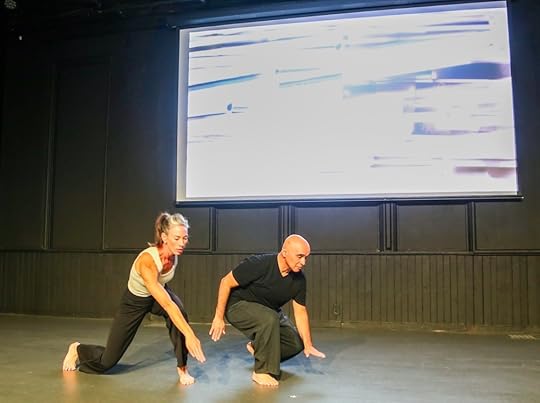 Ruben T. Ornelas and Alaina Olivieri perform Opus, choreographed by Ornelas, at the Multi-Use Community Cultural Center/Rochester Fringe Festival, 9 September 2025. Photo: Annette Dragon.
Ruben T. Ornelas and Alaina Olivieri perform Opus, choreographed by Ornelas, at the Multi-Use Community Cultural Center/Rochester Fringe Festival, 9 September 2025. Photo: Annette Dragon.We take up arms but we also use them to hug. Arms are one of our main bodily recourses for reaching out, but they are not wings. We cannot fly. We elbow our way into things, but also push back. Arms brace our falls, but can also break. They say that when outstretched, our arms measure the same distance as our height from head to toe.
In Ruben T. Ornelas’s Opus, performed at the Multi-Use Community Cultural Center as part of the Rochester Fringe Festival, arms were the thing. He and Alaina Olivieri danced a duet below Mitch Goldstein’s mesmerizing Artifact 8, a blinking video project of what looked like horizontal strips of black and gray and white (Goldstein’s video is on display, in very different presentation, at the 69th Rochester-Finger Lakes Exhibition at the Memorial Art Gallery). Mirroring the strips (the video is actually of nails or pins not strips of light, but that’s what they looked like on the screen in the theater), Ornelas and Olivieri kept their arms extended for almost the entire performance. They moved toward each other, playing with the minutiae of arm and hand muscles, tendons, ligaments, but never touched.
Almost like birds in a strange formation, they flocked. You thought they might crash into one another at times, but they never did, even as the accompanying instruments in the music of François Houle’s “Guilemette” threatened to tumble and spill. Almost like airplanes, they buzzed around each other, in appreciation, but knowing they could never touch for the danger of destroying the flight. Almost like tightrope walkers, they used their arms to keep their balance, but also to lean, off kilter, spinning away and then back again toward each other.
They seemed to ask how far one could stretch, but never reach their destination? What did it mean to get to the tip, to the edge, of things, but never touch them? The holding was somehow in the reaching.
September 18, 2025
Those Times of Revolution

When Los Lobos sang about revolution in the 1996 song of that name, the lyrics describe a sense of loss: “Where did it go? Can’t say that I know.” We are a far cry from the Beatles’s similarly named song from 1968, the year of the barricades, when they urged everyone to cool out a bit. Now, thirty-odd years later, the flame has burned out, the fists have come down, and fatigue has set in.
At least in the lyrics. The music says something else. The slow-groove drums, the cowbell (more cowbell!), and the tom tom, suggest a persistent propulsion, slower than a flashpoint explosion of revolution, but nowhere near exhausted. The bass can’t stay still and cycles around and around, keeping us wondering. One guitar snarls and snaps with a bluesy riff, the other brings a little James Brown funk chording into play. An organ whispers at the edge of consciousness. What I believe is a melodica arrives with the haunting, reverb ghosts of the past, but also a melody that repeatedly raises its eyebrows if not its fists.
Where did it go, those times of revolution? The song’s music answers the singer’s question. It went into the sound of the song itself. It is preserved there to this day, in the groove, in the pulse, with time itself in the mix, ready to be lifted up again when the right moment arises.
September 15, 2025
What Still Cannot Be Made Coherent
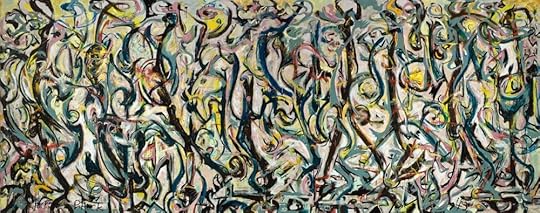 Jackson Pollack, Mural, 1943.
Jackson Pollack, Mural, 1943.What this essay has offered is not a blueprint, but a series of refusals: narrative smoothness and moral simplification, a refusal to let the fracture be folded into the frame. Each voice—Luisa D., Jacobo K., Samuel W., Helen L., and Henryk P.—reminds us that history is not the story of what happened. It is the struggle to name what still cannot be made coherent.
— Jan Burzlaff, “Fragments, not prompts: five principles for writing history in the age of AI”
September 5, 2025
A Form of Reporting From Within
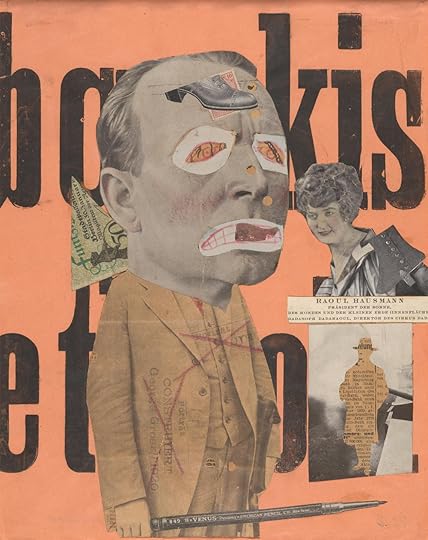 Raoul Hausmann, The Art Critic, 1919-20.
Raoul Hausmann, The Art Critic, 1919-20.The heart of the review is emotion, the stirrings of the soul, receptiveness to the life-changing power of art (even commercial art); personality-centered formats rooted in reporting or in talk are art from the ego, more like homework or social capital. And, though criticism is obviously subjective, at another level it is resolutely objective—a form of reporting from within.
— Richard Brody, “In Defense of the Traditional Review,” New Yorker, 24 July 2025
August 31, 2025
Rovings
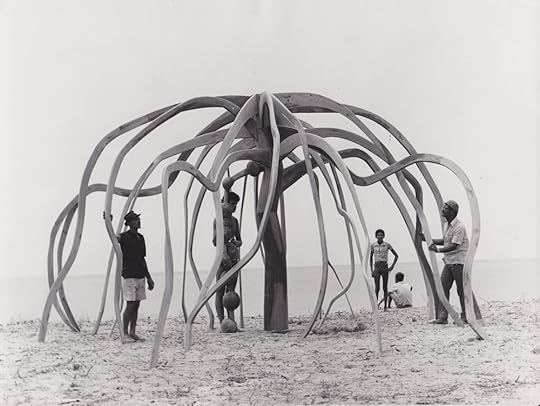 Frans Krajcberg, A flor do mangue, ca. 1970.SoundsPeter Stampfel, Song ShardsChicago Underground Duo, HyperglyphNathan Salzberg, Ipsa CorporaBonnie “Prince” Billy, Nathan Salsburg & Tyler Trotter, Hear The Children Sing The EvidenceSir Richard Bishop, Hillbilly RagasEliades Ochoa, GuajiroDavid Byrne, Who Is the Sky?Jorge Drexler, Bailar en la cuevaJorge Drexler, EcoJorge Drexler, FronteraBooker Little, Booker Little 4 and Max RoachBooker Little, Booker LittleBooker Little, Out FrontWordsMichael Chabon, Gentleman of the RoadJoelle M. Abi-Rached, “Gaza and the End of History,” Boston Review, 30 July 2025Ben Schwartz, “Billy Wilder’s Battle With the Past,” The Nation, 18 August 2025Joshua Tait, “Curtis Yarvin’s Cranky Yearnings,” The Bulwark, 3 April 2025Kenneth Goldsmith, “Jack Whitten,” BOMB Magazine, July 1994James Livingston, James, “Sinners in the Hands of a Complete Unknown,” Liberties, August 2025Rachel Kushner, The Mars RoomJess Walter, So Far GoneWallsFrans Krajcberg, Rediscovering the Tree @ MASPPicture Gallery in Transformation @ MASPFessel, Nós Combinamos de Não Morrer @ Museum da cidade do RioElizabeth Catlett: A Black Revolutionary Artist and All That It Implies @ Art Institute of ChicagoStagesA Conversation with Steve McQueen and Paul Gilroy @ CUNY Graduate Center, 4 April 2025ScreensIn the Air Tonight, dir. Andrew Norman Wilson
Bella
Occupied City, dir. Steve McQueenBlack BagThe AmateurYesterday
Frans Krajcberg, A flor do mangue, ca. 1970.SoundsPeter Stampfel, Song ShardsChicago Underground Duo, HyperglyphNathan Salzberg, Ipsa CorporaBonnie “Prince” Billy, Nathan Salsburg & Tyler Trotter, Hear The Children Sing The EvidenceSir Richard Bishop, Hillbilly RagasEliades Ochoa, GuajiroDavid Byrne, Who Is the Sky?Jorge Drexler, Bailar en la cuevaJorge Drexler, EcoJorge Drexler, FronteraBooker Little, Booker Little 4 and Max RoachBooker Little, Booker LittleBooker Little, Out FrontWordsMichael Chabon, Gentleman of the RoadJoelle M. Abi-Rached, “Gaza and the End of History,” Boston Review, 30 July 2025Ben Schwartz, “Billy Wilder’s Battle With the Past,” The Nation, 18 August 2025Joshua Tait, “Curtis Yarvin’s Cranky Yearnings,” The Bulwark, 3 April 2025Kenneth Goldsmith, “Jack Whitten,” BOMB Magazine, July 1994James Livingston, James, “Sinners in the Hands of a Complete Unknown,” Liberties, August 2025Rachel Kushner, The Mars RoomJess Walter, So Far GoneWallsFrans Krajcberg, Rediscovering the Tree @ MASPPicture Gallery in Transformation @ MASPFessel, Nós Combinamos de Não Morrer @ Museum da cidade do RioElizabeth Catlett: A Black Revolutionary Artist and All That It Implies @ Art Institute of ChicagoStagesA Conversation with Steve McQueen and Paul Gilroy @ CUNY Graduate Center, 4 April 2025ScreensIn the Air Tonight, dir. Andrew Norman Wilson
Bella
Occupied City, dir. Steve McQueenBlack BagThe AmateurYesterday
August 29, 2025
Get Out the Way
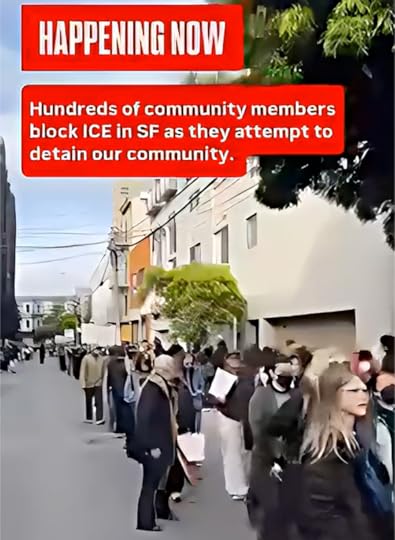
Likely without knowing it, but also perhaps knowing it at some level in their bones, anti-ICE protesters in San Francisco drew upon a phrase from an old minstrel song as a resource for resistance. “Boom ICE, get out the way!” they chanted in the summer of 2025, summoning from distant, murky, folkloric memory the chorus to “Old Dan Tucker.”
Of course, the more immediate source of their protest chant came from hip hop, with songs such as Ludacris’s “Move Bitch Get Out Da Way,” from 2012. But that phrase, “Get out the way” goes way back, way earlier. Maybe it was speaking through Ludacris and the protesters as much as they were speaking it.
“Get out the way, Old Dan Tucker, you’re too late to git your supper!” That’s the lyric in Dan Emmett’s 1843 sheet music popularization of the song, whose music seems to come from the mists of time, but is likely an amalgam of African American and Scots-Irish origins. Emmett performed the song with the Virginia Minstrels, the group of blackface minstrel performers who made it big with the extremely controversial and problematic racist genre of performance in the 1840s, but Emmett claimed to have written “Old Dan Tucker” in the early 1830s. The song, after Emmett’s popularization, entered into the popular and vernacular imagination, producing myriad variants. Some are racist burlesques, offensive to the core. Others are nonsense children’s songs. Still other versions hint at different sonic, cultural, and political energies. For instance, the Hutchinson Family Singers performed “Get Off the Track!,” an 1844 version with abolitionist lyrics. They also transformed many other minstrel songs into abolitionist anthems.
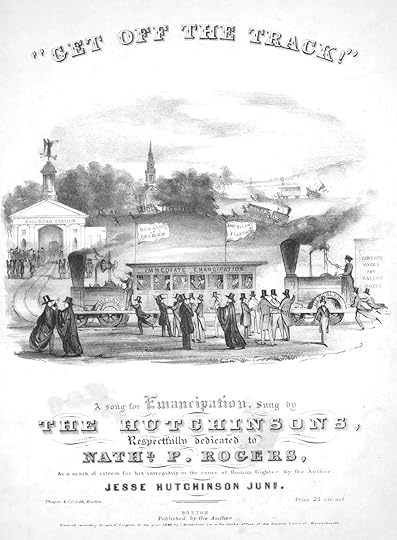 “Get Off the Track, A Song for Emancipation,” words by Jesse Hutchinson , Jr.; tune “Old Dan Tucker,”; performed by the Hutchinson Family Singers, 1844.
“Get Off the Track, A Song for Emancipation,” words by Jesse Hutchinson , Jr.; tune “Old Dan Tucker,”; performed by the Hutchinson Family Singers, 1844.“Get out the way!” I always picture the song as an assertion to someone in authority, warning him that his time is coming due. He better watch out. The jig is up. Of course, like any folk song, “Old Dan Tucker” can be deployed in a multitude of ways. It can serve many ends. No matter which one it is, however, from meaningless children’s song to racist minstrel-show satire to working-class swagger to abolitionist anthem to 2025 protest chant, “Old Dan Tucker” is a song about power. The power of nonsense lyrics. The power of protest. The power of being fed up. Get out the way. That’s the message. I always imagine that when the hour got later and the kids were put to bed, audiences in the nineteenth century rhymed Tucker with a different word than supper. One starting with mother. Perhaps.
In the 2025 case, the song’s key line was invoked as a warning. It surfaced to protest ICE and the Trump administration’s outrageous attacks on American public life and civil society, on vulnerable populations, on immigrants and the larger vision of a multiethnic, multiracial, multicultural democracy, on freedom itself. It was a chant against all those Old Dan Tuckers who have resurfaced suddenly in American life to think that their supper is always going to show up on the table, prepared by underlings and ready to gobble up. Not so fast, announced the protesters, not right now, and not anymore.
Singing and marching in 2025, their chant reminds us that the American past—even its most vile, racist corners—sometimes gathers other forms, entities, and reverberations. Ghosts can leap out from its dusty cabinets, forgotten bins, and hidden closets in surprising new guises. They can speak old words in new voices, dance old steps in new shoes, occupy new spaces, and echo down new streets. Fresh modes of democratic dissent suddenly seem to appear, as if from nowhere, rough and rowdy and ready for use. Actually, they are always there for the taking, for the making, for invocation, for restaging and repurposing, for announcement of things to come. Just when one might think that the past is worthless in the present, it comes roaring forth again to declare itself. “Get out the way!”
Those protesters remind us that the future is unknown, and who will be left standing—or who one day will have a seat at the table and a place to eat at the feast—remains yet to be determined.
August 27, 2025
I Hear Music In the Air
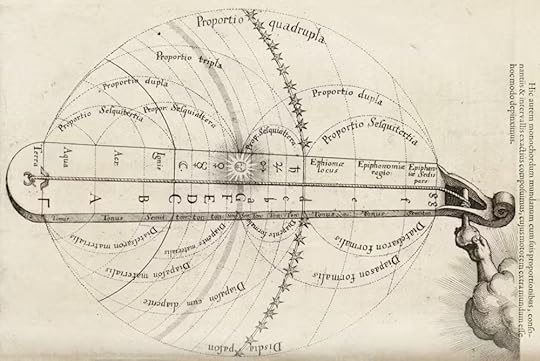 Illustration of the “cosmic lyre”, from the first volume of Robert Fludd’s Utriusque Cosmi, Maioris scilicet et Minoris, 1617.
Illustration of the “cosmic lyre”, from the first volume of Robert Fludd’s Utriusque Cosmi, Maioris scilicet et Minoris, 1617.
Notice the phrase, “in the air.” This is a way of saying that music transports us differently than watching and reading, because even though it’s invisible, sound moves through space at a certain speed, then causes eardrums to vibrate, and in doing so it reorganizes the hierarchy of the larger sensorium, subordinating the eye to the ear by mobilizing the rest of the body, forcing the mind to catch up, or just leaving it behind. Under the spell of music, time doesn’t stand still, it dilates, unfolds, expands; for when memory’s archive becomes the body, chronology stops making sense. To paraphrase Jacques Attali, music makes the simultaneity of different times—or different stages of history—audible, sometimes so effectively that you can dance to it.
— James Livingston, “Sinners in the Hands of a Complete Unknown,” Liberties
August 8, 2025
Syllabus—Modern America
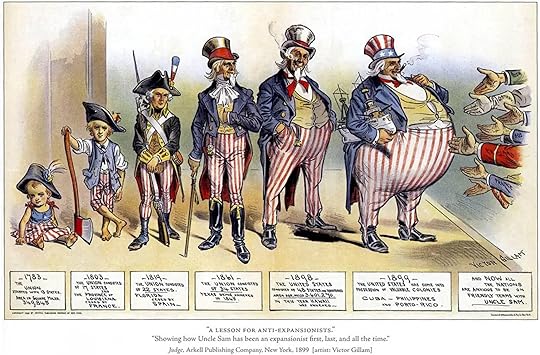 Instructor info
Instructor infoDr. Michael J. Kramer, Department of History, SUNY Brockport, mkramer@brockport.edu
Who is your instructor?Michael J. Kramer specializes in modern US cultural and intellectual history, transnational history, public history, digital humanities, and cultural criticism. He is an associate professor of history at the State University of New York (SUNY) Brockport, the author of The Republic of Rock: Music and Citizenship in the Sixties Counterculture (Oxford University Press, 2013), and the director of the Berkeley Folk Music Festival Project. He is currently working on a history of the 1976 United States bicentennial celebration and a study of folk music, technology, and cultural democracy in the United States. He edits The Carryall, an online journal of US cultural and intellectual history and maintains a blog of cultural criticism, Culture Rover. His website, with additional information about publications, projects, courses, talks, and more can be found at michaeljkramer.net.
What are we up to?This course offers you the opportunity to understand the basics of US history from 1865, when the Civil War ended, to the present. We pursue reading, online interactive asynchronous lectures, and in-class worksheets, source analyses, and discussion. As you acquire a better grasp of the particular history of the US since 1865, we also explore historical method, or how history functions as a mode of inquiry by way of evidence-based assessment and interpretation. History turns out not merely to be one person’s opinion, but instead a collective, fact-based mode of investigation that turns to sources (words, numbers, images, sounds, events, biographies, built environments, and more) to ask questions, offer claims based on the evidence, and engage in civil debate with others about competing interpretations of what happened and how to understand it. As we study the US since the Civil War, we will begin to address the key role of argumentation, or how close, careful “readings” of different types of evidence can undergird fact-based arguments about the past. We will also explore six crucial aspects of historical study: (1) change over time (what is the narrative of how people got from one moment to another?); (2) context (how is one source embedded in a particular place and time and setting?); (3) causality (what caused what to happen?); (4) contingency (how do we account for the unexpected and the unanticipated in history?—the past is not about reproducible results, but rather surprises and new forces and forms); (5) complexity (how do we not simplify the thick textures of the past?); and (6) continuity (what particular questions, themes, issues, forces recur even as they take on new forms?). Students are expected to attend class, complete all assignments, and participate in discussions. If they do so, they will leave the class with a better sense of the history of the United States; what it means to study history; and how doing so feeds the development of crucial professional and personal skills of critical thinking and effective communication.
Things you are expected to do this termBy taking this course you are agreeing to do the following:
Purchase the online textbook.Register for the WW Norton student set so that your work gets recorded in gradebook.Complete the readings.Complete the assignments.Come to class prepared.Participate in discussions in class through comments, completing worksheets, and listening and responding to others thoughtfully.Be respectful to yourself, your instructor, and your fellow students.Required booksFoner, Eric, et. al. Illumine EBook Give Me Liberty! Volume II Brief 7th Edition. New York: WW Norton, 2023. Be sure to purchase the proper edition of the book: the online “Illumine” version of Volume II Brief 7th Edition and register for the student set.Additional assigned documents and resources on Brightspace course website.ScheduleRaising the Flag: IntroductionMonday, August 25
Did the Civil War Ever End? The Reconstruction EraWednesday, August 27
To do:
Monday, September 01 No Class—Labor Day
Wednesday, September 03
To do:
Monday, September 08
To do:
Wednesday, September 10
To do:
Monday, September 15
To do:
Wednesday, September 17
To do:
Monday, September 22
To do:
Wednesday, September 24
To do:
Monday, September 29
To do:
Wednesday, October 01
To do:
Monday, October 06
To do:
Wednesday, October 08
To do:
Monday, October 13 No Class—Fall Break
A Crisis of Industrial Capitalism: The Great Depression and the New DealWednesday, October 15
To do:
Monday, October 20
To do:
Wednesday, October 22
To do:
Monday, October 27
To do:
Wednesday, October 29
To do:
Monday, November 03
To do:
Wednesday, November 05
To do:
Monday, November 10
To do:
Wednesday, November 12
To do:
Monday, November 17
To do:
Wednesday, November 19
To do:
No Class—Thanksgiving Break
The Great Recession and Occupy Wall StreetMonday, December 01
To do:
Wednesday, December 03
Complete Foner, Chapter 28 “Check Your Understanding” QuestionsComplete Foner, Chapter 28 InquizitiveWatch Making America Great Again? VoiceThread lecture and answer questionRead Barack Obama, State of the Union Address (2016) and, optional, watch itRead Donald Trump, Inaugural Address (2017) and, optional, watch itFinalMonday, December 15
Any late “Check Your Understanding” Questions and Inquizitives due (lateness penalty may apply)Any late VoiceThread lecture questions due (lateness penalty may apply)Assignments and evaluationsStudent Introduction Info Sheet = 5%Illumine Ebook “Check Your Understanding” Questions = 15%Inquizitives = 25%Voicethread Quizzes = 15%In-Class Worksheets and Participation (at least 75% must be completed in-class to qualify for credit) = 40%RubricYes! = A-level work.
on-time submission of assignmentsfor class meetings, regular attendance and timely preparation overall, plus insightful, constructive, respectful, and regular participation in class discussionsa thorough understanding of required course materials as expressed in seminar meeting participationFor writing assignments:accurate, clear, well-written responses to prompts when relevanta credible, persuasive argument of originalityargument persuasively supported by relevant, accurate, and clearly explicated evidencepersuasive integration of argument and evidence in an insightful overall analysisexcellent organization: introduction, topic sentences, coherent paragraphs, use of evidence, contextualization, analysis, smooth transitions, conclusiongraceful, clear, logical prose style with effective word choice, avoidance of clichés, and free of spelling and grammatical errorscorrect page formatting when relevant, with regular margins, double spaced, and 12-point fontaccurate formatting of footnotes and, when required, bibliography with required citation and documentation using Chicago Manual of Style guidelines
Getting Closer = B-level work, It is good, but with minor problems in one or more areas that need improvement.
Needs Work = C-level work is acceptable, but with major problems in several areas or a major problem in one area.
Needs A Lot of Work = D-level work. It shows major problems in multiple areas, including missing or late assignments, missed class meetings, and other shortcomings.
Nope = E-level work is unacceptable. It fails to meet basic course requirements and/or standards of academic integrity/honesty.
Citation and style guide: Using Chicago Manual of StyleHistorians generally use Chicago Manual of Style for citation, bibliography, and formatting. Please familiarize yourself with Chicago Manual of Style.
There is a nice overview of citation at the Chicago Manual of Style websiteFor additional, helpful guidelines, visit the Drake Memorial Library’s Chicago Manual of Style pageYou can always go right to the source: the Chicago Manual of Style is available for reference at the Drake Memorial Library Reserve DeskWriting consultationWriting Tutoring is available through the Academic Success Center. It will help at any stage of writing. Be sure to show your tutor the assignment prompt and syllabus guidelines to help them help you.
Research consultationThe librarians at Drake Memorial Library are an incredible resource. You can consult with them remotely or in person. To schedule a meeting, go to the front desk at Drake Library or visit the library website’s Consultation page.
Attendance policyYou will certainly do better with evaluation in the course, learn more, and get more out of the class the more you attend meetings, participate in discussions, complete readings, and finish assignments. That said, lives get complicated. Therefore, you may miss up to six class meetings, with or without a justified reason, with no penalty. You do not need a note from a doctor, but feel free to notify the instructor of your absence. If you are ill, please stay home and take precautions if you have any covid or flu symptoms. Masks are welcome in class if you are still recovering from illness or feel sick. After six absences, subsequent absences will result in reduction of final course grade at the discretion of the instructor. Please note: the instructor does not offer extra credit in this course.
Disabilities and accommodationsIn accordance with the Americans with Disabilities Act and Brockport Faculty Senate legislation, students with documented disabilities may be entitled to specific accommodations. SUNY Brockport is committed to fostering an optimal learning environment by applying current principles and practices of equity, diversity, and inclusion. If you are a student with a disability and want to utilize academic accommodations, you must register with Student Accessibility Services (SAS) to obtain an official accommodation letter which must be submitted to faculty for accommodation implementation. If you think you have a disability, you may want to meet with SAS to learn about related resources. You can find out more about Student Accessibility Services or by contacting SAS via the email address sasoffice@brockport.edu or phone number (585) 395-5409. Students, faculty, staff, and SAS work together to create an inclusive learning environment. Feel free to contact the instructor with any questions.
Discrimination and harassment policiesSex and Gender discrimination, including sexual harassment, are prohibited in educational programs and activities, including classes. Title IX legislation and College policy require the College to provide sex and gender equity in all areas of campus life. If you or someone you know has experienced sex or gender discrimination (including gender identity or non-conformity), discrimination on the basis of sexual orientation or pregnancy, sexual harassment, sexual assault, intimate partner violence, or stalking, we encourage you to seek assistance and to report the incident through these resources. Confidential assistance is available on campus at Hazen Center for Integrated Care. Another resource is RESTORE. Note that by law faculty are mandatory reporters and cannot maintain confidentiality under Title IX; they will need to share information with the Title IX & College Compliance Officer.
Statement of equity and open communicationWe recognize that each class we teach is composed of diverse populations and are aware of and attentive to inequities of experience based on social identities including but not limited to race, class, assigned gender, gender identity, sexuality, geographical background, language background, religion, disability, age, and nationality. This classroom operates on a model of equity and partnership, in which we expect and appreciate diverse perspectives and ideas and encourage spirited but respectful debate and dialogue. If anyone is experiencing exclusion, intentional or unintentional aggression, silencing, or any other form of oppression, please communicate with me and we will work with each other and with SUNY Brockport resources to address these serious problems.
Disruptive student behaviorsPlease see SUNY Brockport’s procedures for dealing with students who are disruptive in class.
Emergency alert systemIn case of emergency, the Emergency Alert System at The College at Brockport will be activated. Students are encouraged to maintain updated contact information using the link on the College’s Emergency Information website.
August 6, 2025
Syllabus—US Since 1929
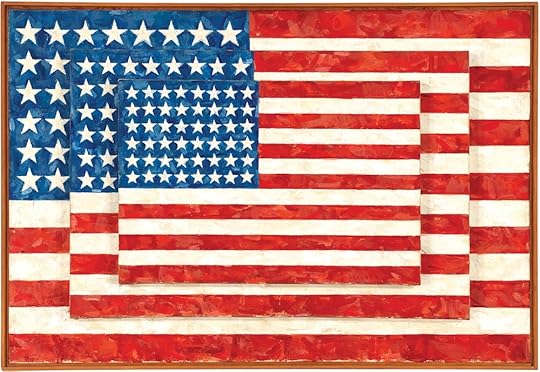 Jasper Johns: Three Flags, 1958.Instructor info
Jasper Johns: Three Flags, 1958.Instructor infoDr. Michael J. Kramer, Department of History, SUNY Brockport, mkramer@brockport.edu.
Who is your instructor?Michael J. Kramer specializes in modern US cultural and intellectual history, transnational history, public history, digital humanities, and cultural criticism. He is an associate professor of history at the State University of New York (SUNY) Brockport, the author of The Republic of Rock: Music and Citizenship in the Sixties Counterculture (Oxford University Press, 2013), and the director of the Berkeley Folk Music Festival Project. He is currently working on a history of the 1976 United States bicentennial celebration and a study of folk music, technology, and cultural democracy in the United States. He edits The Carryall, an online journal of US cultural and intellectual history and maintains a blog of cultural criticism, Culture Rover. His website, with additional information about publications, projects, courses, talks, and more can be found at michaeljkramer.net.
What are we up to?In this research-intensive course, we explore US history from 1929 to the present. Building on your basic understanding of US history, the course helps you develop: 1. an understanding of US history since 1929; 2. a more sophisticated comprehension of historiographic debates about US history since 1929 (the interpretive disagreements that historians have); 3. the capacity to analyze history as an empirically driven approach to interpreting, understanding, and narrativizing the past; 4. identification of key themes in twentieth-century American history concerning issues of power, identity, race, gender, class, sexuality, region, culture, the law, the state, politics, economics, and ideas; 5. the opportunity to improve your research, writing, and communication skills through a short essay based on original research; 6. the ability to synthesize and handle informational complexity (or how to “gut” a book); 7. a deeper set of resources and knowledge for teaching and other professional pursuits. We will be doing a lot of reading, but you will learn how to read for historical understanding more efficiently and effectively. Each student will complete a short biweekly teaching/research assignment; a midterm research proposal, and a final essay based on original research. The quality of our seminar depends on your participation, which involves a commitment to preparation, respectful listening and responding, and willingness to take intellectual chances in the course.
Things you are expected to do this termBy taking this course you are agreeing to do the following to the best of your abilities:
Complete the readings.Come to class prepared.Participate in discussions in class through both comments and listening and responding to others.Complete the assignments.Be respectful of yourself, your instructor, and your fellow students.This is a hybrid synchronous course. If you are attending online, please find a quiet place with a good internet connection to join the course; keep your camera on and use a headset if possible.Required booksPurchase used or new at Brockport bookstore or wherever you wish to purchase or available at SUNY Brockport Drake Memorial Library Reserves or through Interlibrary Loan from Drake Library or your local library.
Cowie, Jefferson. The Great Exception: The New Deal and the Limits of American Politics. Princeton, NJ: Princeton University Press, 2016. ISBN: 9780691175737Fraser, Steve, and Gary Gerstle, eds. The Rise and Fall of the New Deal Order, 1930-1980. Princeton, NJ: Princeton University Press, 1990. ISBN: 9780691006079Erenberg, Lewis A. and Susan E. Hirsch, eds. The War in American Culture: Society and Consciousness during World War II. Chicago: University of Chicago Press, 1996. ISBN: 9780226215129Dudziak, Mary L. War Time: An Idea, Its History, Its Consequences. New York: Oxford University Press, 2013. ISBN: 9780199315857Cohen, Lizabeth. A Consumers’ Republic: The Politics of Mass Consumption in Postwar America. New York: Alfred A. Knopf, 2003. ISBN: 9780375707377Jeffries, Hasan Kwame. Bloody Lowndes: Civil Rights and Black Power in Alabama’s Black Belt. New York: New York University Press, 2009. ISBN: 9780814743317Farber, David, ed. The Sixties: From Memory to History. Chapel Hill: University of North Carolina Press, 1994. ISBN: 9780807844625Bailey, Beth L., and Dave Farber, eds. America in the Seventies. Lawrence: University Press of Kansas, 2004. ISBN: 9780700613274Winant, Gabriel. The Next Shift: The Fall of Industry and the Rise of Health Care in Rust Belt America. Cambridge, MA: Harvard University Press, 2021. ISBN: 9780674292192McGrath, Tom. Triumph of the Yuppies: America, the Eighties, and the Creation of an Unequal Nation. New York: Grand Central Publishing, 2024. ISBN: 9781538725993Lichtenstein, Nelson, and Judith Stein. A Fabulous Failure: The Clinton Presidency and the Transformation of American Capitalism. Princeton, NJ: Princeton University Press, 2023. ISBN: 9780691245522Beck, Richard. Homeland: American Life in the War on Terror. New York: Crown, 2024. ISBN: 9780593240229Serwer, Adam. The Cruelty Is the Point: The Past, Present, and Future of Trump’s America. New York: One World, 2022. ISBN: 9780593230824ScheduleIntroductionsMonday, August 25
Introductions
Readings:
Thomas Andrews and Flannery Burke. “What Does It Mean to Think Historically?,” Perspectives on History, January 2007Earls, Averill, Elizabeth Garner Masarik, Sarah Handley-Cousins, and Marissa C. Rhodes. “What about Continuity?” Perspectives on History, Spring 2024Library of Congress Primary Source Analysis Tool for StudentsThe New Deal and the Great ExceptionWednesday, August 27
The Stock Market Crash, Great Depression, and New Deal
Readings:
Cowie, Jefferson. The Great Exception: The New Deal and the Limits of American Politics. Princeton, NJ: Princeton University Press, 2016, Prologue and IntroductionMonday, September 01 No Class—Labor Day
Tuesday, September 02
Assignment:
Student IntroductionWednesday, September 03
The New Deal and the “Great Exception”
Readings:
Cowie, Jefferson. The Great Exception: The New Deal and the Limits of American Politics. Princeton, NJ: Princeton University Press, 2016, Chapters 01-07The Rise and Fall of the New Deal OrderMonday, September 08
New Deal Order Rise and Fall
Readings:
Fraser, Steve, and Gary Gerstle, eds. The Rise and Fall of the New Deal Order, 1930-1980. Princeton, NJ: Princeton University Press, 1990, Introduction, Part 01Primary Source Options:
PBS US History Collection, The New DealDocsTeach, The New Deal: Revolution or Reform?Digital Public Library of America (DPLA), The New DealLibrary of Congress, The New DealNational Archives Picturing the Century, The Great Depression and the New DealFlorida Atlantic University Libraries Great Depression & New Deal: Primary Source CollectionsOr find your own!Wednesday, September 10
Neoliberal Order After 1970
Readings:
Fraser, Steve, and Gary Gerstle, eds. The Rise and Fall of the New Deal Order, 1930-1980. Princeton, NJ: Princeton University Press, 1990, Introduction, Part 02Friday, September 12
Assignment:
Monday, September 15
Seeking Unity in the American Way
Readings:
Erenberg, Lewis A. and Susan E. Hirsch, eds. The War in American Culture: Society and Consciousness during World War II. Chicago: University of Chicago Press, 1996, Introduction, Parts 01 and 02Primary Source Options:
PBS US History Collection, WWIINational Archives DocsTeach, WWIIUniversity of Washington Research Guide, Primary Sources — WWIILibrary of Congress, WWIIThe National WWII MuseumOr find your ownWednesday, September 17
Mobilization and Its Effects
Readings:
Erenberg, Lewis A. and Susan E. Hirsch, eds. The War in American Culture: Society and Consciousness during World War II. Chicago: University of Chicago Press, 1996, Introduction, Parts 03-05Margot Canaday, “Building a Straight State: Sexuality and Social Citizenship under the 1944 G.I. Bill,” The Journal of American History 90, 3 (December 2003): 935-957Wartime from WWII to NowMonday, September 22
What Was WWII?
Readings:
Dudziak, Mary L. War Time: An Idea, Its History, Its Consequences. New York: Oxford University Press, 2013, Introduction, Chapters 01 and 02Wednesday, September 24
US Wars After WWII
Readings:
Dudziak, Mary L. War Time: An Idea, Its History, Its Consequences. New York: Oxford University Press, 2013, Introduction, Chapters 03, 04, and ConclusionPostwarMonday, September 29
Origins and Birth of a Consumers’ Republic
Readings:
Cohen, Lizabeth. A Consumers’ Republic: The Politics of Mass Consumption in Postwar America. New York: Alfred A. Knopf, 2003, Prologue, Part 01 and 02Robert Korstad and Nelson Lichtenstein, “Opportunities Found and Lost: Labor, Radicals, and the Early Civil Rights Movement,” Journal of American History 75, 3 (December 1988): 786–811Manfred Berg, “Black Civil Rights and Liberal Anticommunism: The NAACP in the Early Cold War,” Journal of American History 94, 1 (June 2007): 75–96Wednesday, October 01
Landscape and Politics of a Consumers’ Republic
Readings:
Cohen, Lizabeth. A Consumers’ Republic: The Politics of Mass Consumption in Postwar America. New York: Alfred A. Knopf, 2003, Part 03, 04, EpilogueMichelle Nickerson, “Women, Domesticity, and Postwar Conservatism,” OAH Magazine of History 17, 2: Conservatism (January 2003): 17-21Primary Source Options:
PBS US History Collection, The Cold WarDocsTeach, Cold WarDocsTeach, American Society of the 1950s and 1960sDocsTeach, Tensions of the Cold WarTracey, Liz. “Joseph McCarthy in Wheeling, West Virginia: Annotated.” JSTOR Daily, 24 March 2025Tracey, Liz. “Declaration of Conscience: Annotated.” JSTOR Daily, 23 June 2023Baruch College, Consumer CultureOr find your ownCivil Rights and Black Power After WWIIMonday, October 06
A Freedom Struggle Develops
Readings:
Jeffries, Hasan Kwame. Bloody Lowndes: Civil Rights and Black Power in Alabama’s Black Belt. New York: New York University Press, 2009, Introduction and Chapters 01-04Primary Source Options:
PBS US History Collection, Civil Rights MovementLibrary of Congress, Civil Rights MovementNational Archives, Civil RightsWisconsin Historical Society, 1964 Freedom Summer ProjectUniversity of Alabama, Jim Peppler Southern Courier Photograph CollectionStudent Nonviolent Coordinating Committee (SNCC) Digital Gateway Primary SourcesFreedom’s Ring ProjectBill Moyers, Two Versions of John Lewis Speech, 1963 March on Washington for Jobs and FreedomOr find your ownWednesday, October 08
Black Power and Other Civil Rights Movements: Two Case Studies and Their Larger Implications
Readings:
Jeffries, Hasan Kwame. Bloody Lowndes: Civil Rights and Black Power in Alabama’s Black Belt. New York: New York University Press, 2009, Chapters 05-07 and EpilogueLori Flores, “An Unladylike Strike Fashionably Clothed: Mexican American and Anglo Women Garment Workers Against Tex-Son, 1959-1963,” Pacific Historical Review 78, 3 (August 2009), 367-402Friday, October 10
Assignment:
World War II Teaching Assignment Using Primary SourcesMonday, October 13 No Class—Fall Break
The SixtiesWednesday, October 15
The Sixties in History and Memory
Readings:
Farber, David, ed. The Sixties: From Memory to History. Chapel Hill: University of North Carolina Press, 1994, Introduction, Chapters 01-04Primary Source Options:
PBS US History Collection, Vietnam WarLibrary of Congress, LGBTQ ActivismLibrary of Congress, Arts and Entertainment, 1945-1968DocsTeach, CountercultureAmerican Archive of Public Broadcasting, Student Protests in the 1960sYoung Americans for Freedom, Sharon Statement, 1960Students for a Democratic Society, Port Huron Statement, 1962Free Speech Movement Digital Archive Text DocumentsSixties Project: Primary Document ArchiveCNU Primary Sources, 1960s: WomenMonday, October 20
The Sixties in History and Memory
Readings:
Farber, David, ed. The Sixties: From Memory to History. Chapel Hill: University of North Carolina Press, 1994, Introduction, Chapters 06-10The SeventiesWednesday, October 22
The Age of Decadence or Limits?
Readings:
Bailey, Beth L., and Dave Farber, eds. America in the Seventies. Lawrence: University Press of Kansas, 2004, Introduction, Chapters 01-04Primary Source Options:
American Archive of Public Broadcasting, The American Indian Movement (AIM)CNU Primary Sources, 1970sDocsTeach, 1970s America‘Ritchie, Donald A. “Investigating the Watergate Scandal.” OAH Magazine of History 12, no. 4 (1998): 49–53PBS US History Collection, Watergate | Journalism in ActionPBS US History Collection, The Oil Crisis | Teaching with Primary SourcesOr find your ownFriday, October 24
Assignment:
Monday, October 27
The Age of Decadence or Limits?
Readings:
Bailey, Beth L., and Dave Farber, eds. America in the Seventies. Lawrence: University Press of Kansas, 2004, Chapters 05-09Katherine Turk, “Out of the Revolution, into the Mainstream: Employment Activism in the NOW Sears Campaign and the Growing Pains of Liberal Feminism,” Journal of American History 97, 2 (September 2010): 399–423DeindustrializationWednesday, October 29
The First Shift: Factory Work
Readings:
Winant, Gabriel. The Next Shift: The Fall of Industry and the Rise of Health Care in Rust Belt America. Cambridge, MA: Harvard University Press, 2021, Introduction, Chapters 01-03Friday, October 31
Assignment:
Monday, November 03
The Next Shift: Care Work
Readings:
Winant, Gabriel. The Next Shift: The Fall of Industry and the Rise of Health Care in Rust Belt America. Cambridge, MA: Harvard University Press, 2021, Chapters 04-06, EpilogueDePillis, Lydia, and Christine Zhang. “How Health Care Remade the U.S. Economy.” The New York Times, 03 July 2025The EightiesWednesday, November 05
Rise of the Yuppies in Reagan’s America
Readings:
McGrath, Tom. Triumph of the Yuppies: America, the Eighties, and the Creation of an Unequal Nation. New York: Grand Central Publishing, 2024, Introduction, Parts I-IIIPrimary Source Options:
DocsTeach, 1980sMiller Center, Ronald Reagan SpeechesOr find your ownFriday, November 07
Assignment:
Monday, November 10
Fall of the Yuppies in Reagan’s America?
Readings:
McGrath, Tom. Triumph of the Yuppies: America, the Eighties, and the Creation of an Unequal Nation. New York: Grand Central Publishing, 2024, Parts IV-VGottlieb, Dylan. “Hoboken Is Burning: Yuppies, Arson, and Displacement in the Postindustrial City.” Journal of American History 106, no. 2 (September 1, 2019): 390–416Gottlieb, Dylan. “Yuppies: Young Urban Professionals and the Making of Postindustrial New York.” Enterprise & Society 22, no. 4 (December 2021): 962–69Phillips-Fein, Kim. “The Dark Legacy of Reaganism.” The New Republic, 19 February 2025The NinetiesWednesday, November 12
Rise of Clinton and the Return of New Deal Liberalism?
Readings:
Lichtenstein, Nelson, and Judith Stein. A Fabulous Failure: The Clinton Presidency and the Transformation of American Capitalism. Princeton, NJ: Princeton University Press, 2023, Introduction, Parts I-IIPrimary Source Options:
1996 Telecommunications Reform Act documentsPolitical Rhetoric Archive, President Clinton’s 1997 Welfare to Work SpeechMiller Center, Bill Clinton SpeechesOr find your ownMonday, November 17
Clinton and the New Neoliberalism
Readings:
Lichtenstein, Nelson, and Judith Stein. A Fabulous Failure: The Clinton Presidency and the Transformation of American Capitalism. Princeton, NJ: Princeton University Press, 2023, Parts III-IV, EpilogueGanz, John. “The Year the Clock Broke.” The Baffler 42 (November 2018)The 2000s and the War on TerrorWednesday, November 19
Connecting the Homeland to the Globe
Readings:
Primary Source Options:
9/11 Digital ArchiveGeorge W. Bush Presidential Library, Global War on Terror DocumentsCarnegie Council for Ethics in International Affiars, 2008 Global Financial Crisis: Primary SourcesChristina D. Romer, Council of Economic Advisers, Treatment and Prevention: Ending the Great Recession and Ensuring that It Doesn’t Happen Again, City Club of Cleveland, 3 May 2010Case Western University, Occupy Archive Digital Exhibits: Spring 2020 CWRUOr find your ownFriday, November 21
Assignment:
No Class—Thanksgiving Break
Monday, December 01
Connecting the Globe to the Homeland
Readings:
Beck, Richard. Homeland: American Life in the War on Terror. New York: Crown, 2024, Introduction, Parts III and IV, EpilogueRecent HistoryWednesday, December 03
Readings:
Serwer, Adam. The Cruelty Is the Point: The Past, Present, and Future of Trump’s America. New York: One World, 2022.FinalMonday, December 15
Research Essay DueAssignments and evaluationsStudent Introduction = 5%Teaching Assignments Using Primary Sources 5 x 5% = 25%The Stock Market Crash, Great Depression, and New DealNew DealWWIIPostwarUS Since 1980Research Essay Development 3 x 10% = 30%Research Essay Preliminary IdeasPrimary Source List, Research Question, HypothesisResearch Essay UpdateFinal Research Assignment = 30%Seminar Participation = 10%RubricYes! = A-level work.
on-time submission of assignmentsfor class meetings, regular attendance and timely preparation overall, plus insightful, constructive, respectful, and regular participation in class discussionsa thorough understanding of required course materials as expressed in seminar meeting participationFor writing assignments:accurate, clear, well-written responses to prompts when relevanta credible, persuasive argument of originalityargument persuasively supported by relevant, accurate, and clearly explicated evidencepersuasive integration of argument and evidence in an insightful overall analysisexcellent organization: introduction, topic sentences, coherent paragraphs, use of evidence, contextualization, analysis, smooth transitions, conclusiongraceful, clear, logical prose style with effective word choice, avoidance of clichés, and free of spelling and grammatical errorscorrect page formatting when relevant, with regular margins, double spaced, and 12-point fontaccurate formatting of footnotes and, when required, bibliography with required citation and documentation using Chicago Manual of Style guidelines
Getting Closer = B-level work, It is good, but with minor problems in one or more areas that need improvement.
Needs Work = C-level work is acceptable, but with major problems in several areas or a major problem in one area.
Needs A Lot of Work = D-level work. It shows major problems in multiple areas, including missing or late assignments, missed class meetings, and other shortcomings.
Nope = E-level work is unacceptable. It fails to meet basic course requirements and/or standards of academic integrity/honesty.
Citation and style guide: Using Chicago Manual of StyleHistorians generally use Chicago Manual of Style for citation, bibliography, and formatting. Please familiarize yourself with Chicago Manual of Style.
There is a nice overview of citation at the Chicago Manual of Style websiteFor additional, helpful guidelines, visit the Drake Memorial Library’s Chicago Manual of Style pageYou can always go right to the source: the Chicago Manual of Style is available for reference at the Drake Memorial Library Reserve DeskWriting consultationWriting Tutoring is available through the Academic Success Center. It will help at any stage of writing. Be sure to show your tutor the assignment prompt and syllabus guidelines to help them help you.
Research consultationThe librarians at Drake Memorial Library are an incredible resource. You can consult with them remotely or in person. To schedule a meeting, go to the front desk at Drake Library or visit the library website’s Consultation page.
Attendance policyYou will certainly do better with evaluation in the course, learn more, and get more out of the class the more you attend meetings, participate in discussions, complete readings, and finish assignments. That said, lives get complicated. Therefore, you may miss up to six class meetings, with or without a justified reason, with no penalty. You do not need a note from a doctor, but feel free to notify the instructor of your absence. If you are ill, please stay home and take precautions if you have any covid or flu symptoms. Moreover, masks are welcome in class if you are still recovering from illness or feel sick. After six absences, subsequent absences will result in reduction of final course grade at the discretion of the instructor. Please note: the instructor does not offer extra credit in this course.
Disabilities and accommodationsIn accordance with the Americans with Disabilities Act and Brockport Faculty Senate legislation, students with documented disabilities may be entitled to specific accommodations. SUNY Brockport is committed to fostering an optimal learning environment by applying current principles and practices of equity, diversity, and inclusion. If you are a student with a disability and want to utilize academic accommodations, you must register with Student Accessibility Services (SAS) to obtain an official accommodation letter which must be submitted to faculty for accommodation implementation. If you think you have a disability, you may want to meet with SAS to learn about related resources. You can find out more about Student Accessibility Services or by contacting SAS via the email address sasoffice@brockport.edu or phone number (585) 395-5409. Students, faculty, staff, and SAS work together to create an inclusive learning environment. Feel free to contact the instructor with any questions.
Discrimination and harassment policiesSex and Gender discrimination, including sexual harassment, are prohibited in educational programs and activities, including classes. Title IX legislation and College policy require the College to provide sex and gender equity in all areas of campus life. If you or someone you know has experienced sex or gender discrimination (including gender identity or non-conformity), discrimination on the basis of sexual orientation or pregnancy, sexual harassment, sexual assault, intimate partner violence, or stalking, we encourage you to seek assistance and to report the incident through these resources. Confidential assistance is available on campus at Hazen Center for Integrated Care. Another resource is RESTORE. Note that by law faculty are mandatory reporters and cannot maintain confidentiality under Title IX; they will need to share information with the Title IX & College Compliance Officer.
Statement of equity and open communicationWe recognize that each class we teach is composed of diverse populations and are aware of and attentive to inequities of experience based on social identities including but not limited to race, class, assigned gender, gender identity, sexuality, geographical background, language background, religion, disability, age, and nationality. This classroom operates on a model of equity and partnership, in which we expect and appreciate diverse perspectives and ideas and encourage spirited but respectful debate and dialogue. If anyone is experiencing exclusion, intentional or unintentional aggression, silencing, or any other form of oppression, please communicate with me and we will work with each other and with SUNY Brockport resources to address these serious problems.
Disruptive student behaviorsPlease see SUNY Brockport’s procedures for dealing with students who are disruptive in class.
Emergency alert systemIn case of emergency, the Emergency Alert System at The College at Brockport will be activated. Students are encouraged to maintain updated contact information using the link on the College’s Emergency Information website.



